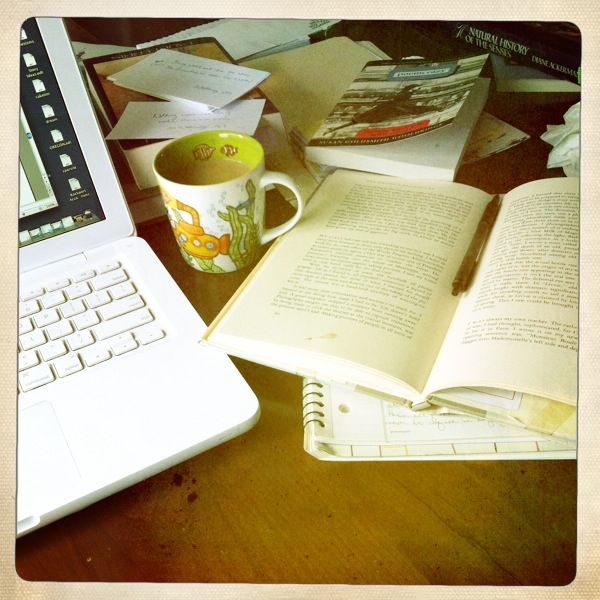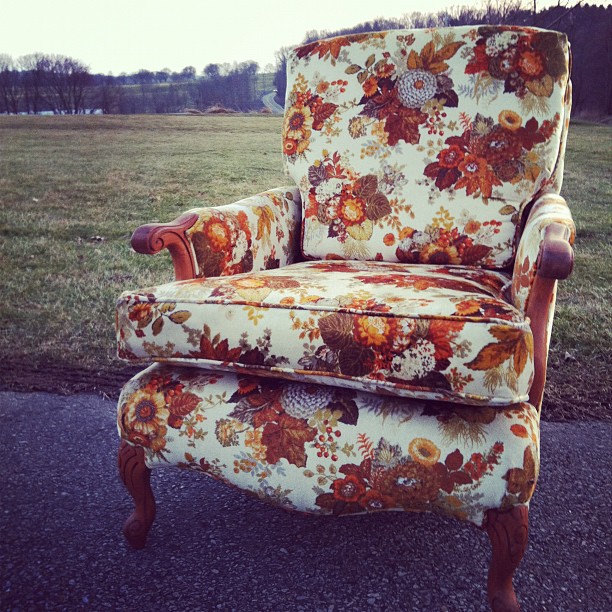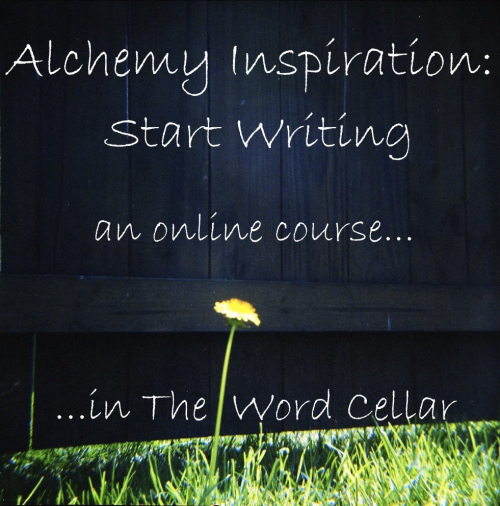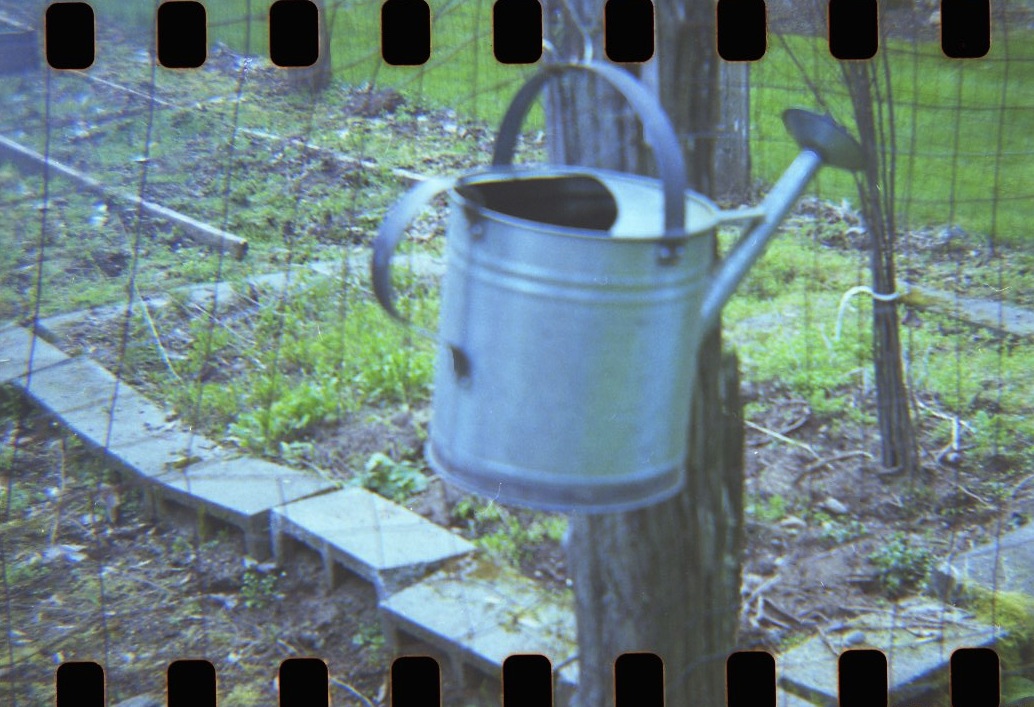
This is Part 4 of an "In The Word Cellar" mini-series about MFA in writing programs. You can read the other posts at the links listed below:
- Part 1: The Road to MFA-ville gives you a short introduction to the mini-series.
- Part 2: Why Get an MFA in Writing? chronicles my decision to apply to graduate school and explores what I was looking for in a program.
- Part 3: Researching & Choosing an MFA Program is a long, meaty post that details how I chose which programs to apply to. It also includes helpful resources and suggestions for anyone considering or applying to an MFA program.
In that last post, I offered an overview of how low-residency programs work and why I liked being in one. First, I'll reprint what I wrote about that, and then I'll get into more details about the logistics of low-res programs, including how the feedback process works and what "critical" work really means in the context of a creative writing program.
How low-res programs work...
Low-res programs usually take four semesters to complete. A semester is six months, so you're basically working on the degree for two years straight. Twice a year you spend about 10 days on campus. (This is the residency part.) During residencies you'll attend lectures, workshops, and readings with faculty members and other students. I found that residencies were like an alternate reality: total immersion in the world of writing. The "real world" of home and work fade away and seem quite distant very quickly. Frankly, it's pretty fantastic to be immersed in the world of writing and the company of other writers.
The rest of the semester is spent off-campus. So it's just you and your writing wherever you live. Each program may be a bit different, but most work like this: Once a month you send packets of writing to your faculty advisor, who will then respond with detailed feedback and recommendations.
A low-res program culminates in the completion of a creative thesis, just as in traditional programs. This is essentially a collection of creative writing you've done over the course of the program. Mine had to be at least 75 pages. It included a collection of essays that belong together plus one "random" essay that wasn't part of the same set. Your creative thesis could be part (or all) of a memoir, a novel, a collection of short stories, or a poetry collection. (The page count for poets is always much shorter, it seems.) My other graduation requirements included writing a critical thesis and writing and delivering a 45-minute lecture.
...and why I think they're great.
It's often said that the low-res model more closely mirrors a writer's life than does a traditional program, and I think that's true. Most of the time, being a writer means sitting down alone and writing. Then you might share your work and get feedback from an editor or your peers, and maybe get together with some fellow writers at a retreat or conference a few times a year. And then it's back to the page. This is how I spent my two years in a low-residency program, which seems to be good training for my post-grad writing life. I'm still working on writing consistently, but I'm so much better at it than I was before grad school. The experience of having monthly deadlines has helped me to become more consistent in my writing. It's also reinforced my need for external deadlines, which I now feed by making commitments with friends to swap work or deciding to send my work to lit journals.
And now for some new material. Please keep in mind that I'm writing from the perspective of my experience with Vermont College of Fine Arts (VCFA). There will be a lot of similarities with other low-res programs, but not all programs work exactly the same way. (If you've gone through a different low-res program, I invite you to leave a comment telling us how your experience was the same or different.)
The advisors
Each semester, a student works with one faculty member as an advisor. Students usually work with a different advisor each semester (for a total of four advisors), but occasionally students will petition the program and ask to work with the same advisor two semesters in a row (usually the last two semesters).
At VCFA, students get a say in who they work with, but it's not guaranteed that they'll work with any particular faculty member. You get more say as you progress through the semesters. As a first semester student you circle a certain number of names of faculty members, with no system for ranking your preference. For example, if there are eight faculty members who teach in your genre, you may be asked to circle six of them that you'd be willing to work with. Starting in your second semester you get to list faculty members by preference. Students in later semesters have more clout in this process, and by your final semester you usually get your first choice. I always ended up working with one of my top two choices for the semester.
The packets (and feedback)
As I mentioned above, each month I sent a packet of work to my advisor. Some advisors request that these be sent via regular mail, while others accept material via email. Either way, my packets consisted of a combination of creative and critical work. (More on what "critical" means below.)
A standard packet consists of 30 pages of writing (often a combination of new and revised material), plus a "cover letter." The term cover letter confuses a lot of people, and sounds like something you'd send with a resume. Not so. This letter to your advisor is an opportunity to ask them questions and to update them on how you're doing creatively. Think of it as a monthly check-in, a written version of what you'd talk about if you met with your advisor during office hours. In return, your advisor will write you a letter, answering your questions, addressing your concerns, and offering writing and reading suggestions.
In addition to this letter, your advisor will provide detailed feedback on the work you submitted. Each advisor has his or her own way of doing this. Some will leave detailed line notes on your work. Others include the bulk of their comments in their main letter or in mini-letters at the end of each piece of writing. Some work electronically (using Word's "track changes" feature to leave comments and line edits on the electronic documents), some work on hard copies, and some may do a combination of both. I know of one faculty member who gives students feedback via audio recording, which sounds strange, but his students usually love it.
You can get a sense, in advance, of how faculty members work and what they like to focus on (which genres or subgenres; do they focus on "big picture" issues such as theme and structure or more detailed items such as language usage, grammar, and word choice). You learn this by reading their teaching statements, getting to know them through their lectures, talking to other students, and by talking directly with the faculty members during group "speed-dating" sessions.
A note about feedback
Just as every faculty member has a different process for giving feedback, each will have a unique perspective and opinion on your writing. This means that you sometimes receive conflicting advice. At first this can be frustrating and confusing, but in the end, I believe it's a gift and an invitation to find your own artistic vision. I've written a separate post on this called Dealing with Feedback.
The "critical" work
Let's talk about what critical work means in the context of a creative writing program.
First off, it's not nearly as dry, boring, or terrible as it sounds. Part of the MFA program is learning to read as a writer; to dive into another author's work and begin to figure out how she made the magic happen on the page. This is learning to look at creative work with a critical eye. Not critical in the sense of being harsh or belittling. Rather, this is about applying critical thinking skills to the craft of writing.
During my first two semesters, my critical work consisted of essays in which I examined how a particular writer or writers used a specific writing device or achieved a particular effect. I looked at a lot of different things in these pieces, including the following: how David Sedaris uses humor to convey deeper truths; how Annie Dillard uses poetic and rhetorical devices to create meaning and mood; and how various authors use details to create lyric intimacy. I also wrote a review of a published memoir, noting what worked and what didn't work in it.
These essays served as the training ground and warm-up for my third and fourth semesters, when I had to complete larger critical projects. In my third semester I wrote a critical thesis entitled "Spinning a Web of Wonder: Capturing and Conveying Awe on the Page," an in-depth examination of how several authors do this, and suggestions on general principles the rest of us can apply to achieve the same effect. For my final semester I had to write (and then present) a lecture. Mine was called "The Secret Life of Language" (description here).
Doing this kind of "critical" reading and writing is a huge part of why my writing improved so much during the program. It was completely different from the literature papers I wrote as an undergrad. It opened my creative eyes to the art and craft of writing. This way of seeing didn't come automatically; it felt awkward at first. But now that I have the hang of it, it's an indispensable skill.
Thankfully, it hasn't taken the joy out of reading at all. Many people -- including me -- tend to worry that this might happen when they start to read and think about writing in this new way. But for me, and the people I know, it's simply enhanced our experience of books. I can pretty much turn the critical faculty on and off as I need to.
Plus, I haven't lost access to the inspiration side of writing. When I write a first draft (and maybe the second and third drafts, too), I'm not usually thinking critically about it. I'm still tapped into the creative, intuitive side of things. But when I come up against a passage that's not working, I can apply this other way of thinking to it and see how I can solve the problem.
Of course, it's not really so bifurcated as this, either. As I learn more about the craft techniques of writing, they become part of my creative psyche, so a lot of the work begins to happen subconsciously as my creative mind applies the critical principles I've learned. It's actually really cool.
What else?
If you'd like to read about low-res programs from the perspective of a faculty member, check out this article by David Jauss, an outstanding author and mentor who teaches at the University of Arkansas at Little Rock and in the low-res program at VCFA. (Note: The link above takes you to the VCFA site where you can request the article via email. The article, entitled "The Real Story Behind Low-Residency MFAs" was originally published in the February 2011 issue of Writer's Digest.)
I've tried to give you more than just a peek into how low-res programs work in general, and how the VCFA program works in particular. What have I missed?
Please chime-in below with your questions or observations about MFA in writing programs, either low-res or traditional.
***For future posts in this MFA mini-series, I'm considering offering a primer on how writing workshops function, and possible alternatives to the MFA program. Do those topics interest you? What else would you like me to address about writing, graduate programs, and the writing life? Let me know in the comments or by email, and I'll consider your questions for future In The Word Cellar columns.
{See all In The Word Cellar posts here.}
 Wednesday, February 8, 2012 at 11:46PM
Wednesday, February 8, 2012 at 11:46PM 
 creativity,
creativity,  in the word cellar,
in the word cellar,  writing,
writing,  writing life,
writing life,  writing tips
writing tips 





